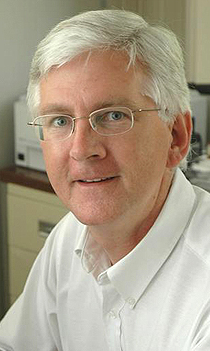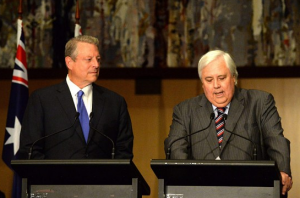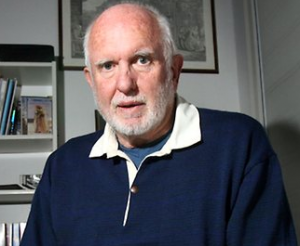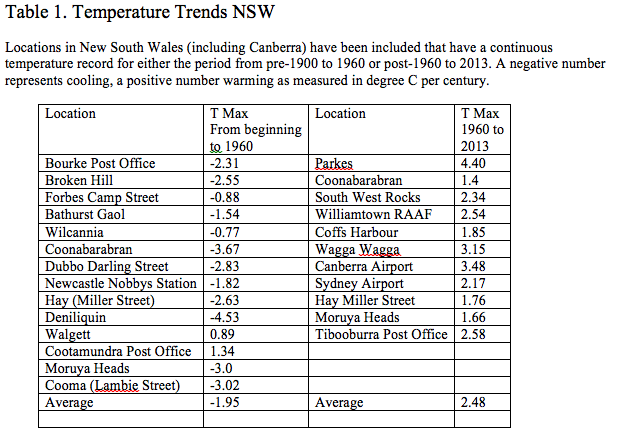“While some have likened global warming skeptics’ scientific research to Big Tobacco-funded research that supposedly showed smoking was not dangerous, I would say that the media’s refusal to report on skeptics’s peer-reviewed research is like the tobacco company executive’s suppression of evidence. Some may claim that the media’s silence is a way of trying to help people – that the tobacco executives were trying to save their own butts, so to speak. But this would mean that the media are putting themselves in the position of deciding what is good for people, rather than just keeping us informed.” Roy Spencer, The Great Global Warming Blunder, 2010, page 36 
Archives for June 2014
Palmer Gored: A Win for Mandated Carbon “Markets”
A new alliance between Al Gore and Clive Palmer is likely to result in the repeal of the carbon tax, but the big winner is probably the global warming industry, not the ordinary Australian. Indeed if you think your electricity bill is about to plummet, you’ve been mislead. 
Much of the increase in the price of electricity over recent years can be attributed to the mandatory Renewable Energy Target (RET): a government legislated requirement on electricity retailers to source a specific proportion of total electricity sales from renewable energy sources including wind and solar, with the extraordinary costs paid by all electricity users.
Al Gore appears to have convinced Clive Palmer, to support the repeal of the carbon tax on condition that the RET is consolidated. Earlier today Dennis Jensen spoke in the Australian parliament about some of the lucrative deals that Gore has done over the years:
Indeed Dr Jensen’s speech provides some historical context, while Jo Nova explains what the conditions Palmer has placed on repeal of the carbon tax will mean longer term for Australia:
It seems now that Palmer’s amendments to repealing the carbon tax do not include an Emissions Trading Scheme … but keeping the $10b Clean Energy Finance Corporation is a win for Gore, and so is keeping the RET (Renewable Energy Target) and the Climate Change Authority — it’s another government funded advertising unit for the carbon scare campaign. The more patrons who are dependent on the carbon-subsidies, the more pro-carbon lobbyists there are. And they lobby like their livelihood depends on it — because they have nothing if the government policies don’t prop up their pretend free market.
As Ross Garnaut, a long-time proponent of climate alarmism and phony markets, commented today:
We’re in a better position than when we were facing abolition of carbon pricing, major tampering with the Renewable Energy Target, abolition of the Climate Change Authority, abolition of the Clean Energy Finance Corporation.
It may not be the ideal way of doing things, but Mr Palmer’s support for keeping existing arrangements will have important effects.
Warming Never Completely Negated Earlier Cooling: Some Thoughts on NSW Temperature Trends
Last night I presented a paper for the Sydney Institute entitled ‘Modelling Australian and global temperatures: what’s wrong? Bourke and Amberley as case studies’. The paper written with Ken Stewart, Dennis Jensen and John Abbot concludes with some thoughts on the New South Wales annual mean maximum temperature record. In particular we suggest that the record can be thought of as showing a cooling trend of -1.95 degree per century to 1960, and a warming trend of 2.48 degree per century since, Table 1.
Taking these values and thinking about them in terms of a rate of cooling for approximately 70 years (1890 to 1960) and then a rate of warming for 54 year (1960 to 2013), we can estimate how much New South Wales cooled and then warmed. The sum of these values gives us the net change, a value that if we then multiple by a total period of 124 years, gives an indication of the rate of cooling per century.
This trend of -0.021 degree C per century suggests that the earlier cooling was almost, but not completely, negated by the later warming. To be clear, the overall temperature trend for New South Wales, calculated from the unhomogenized maximum temperatures as recorded at locations with long series, is one of cooling.
Vale Ray Evans & How to Win an Argument
I first meet Ray Evans at a dinner at the Institute of Public Affairs. It must have been in about 2004, ten years ago, because I had just seen the movie ‘The Day After Tomorrow’. Staring Dennis Quaid as a paleoclimatologist professor, the movie was about the Gulf Stream shutting down resulting in catastrophic global cooling and a new ice age. 
We were seated at the same table and I mentioned that I had enjoyed the movie, that it had been entertaining. He was scathing of my comment, while admitting he hadn’t seen the movie, and didn’t intend to. He understood that it was themed around advocacy for anthropogenic global warming. Ray was already vehemently opposed to the new doctrine. While he wasn’t keen to discuss the plot of the movie, he was keen to engage me in a discussion of the Gulf Stream.
I think that the next time we meet was at a lunch in Perth, also hosted by the IPA. On that occasion he was scathing of my suggestion that wind turbines could be beautiful. I may have also attempted a defence of wind farms as a source of renewable energy. But was properly put in my place by Ray who had a great depth of knowledge, not only of the economics of wind farming, but also of the quantities of steel and cement used in the construction of each turbine and their associated carbon footprint.
Whenever we met, he always managed to challenge my opinion and impart new knowledge and win the argument.
I now know a lot more about renewable energy, especially after reading an article by Ray full of useful facts and distressing politics published by Quadrant in July 2012 entitled ‘The Ruinous Privileges of Renewable Energy’.
Ray also knew a great deal about bushfires and the politics of control burning in Victoria. When it came to many issues, Ray Evans seemed able to see the wood and the trees and how big the forest was, but he never seemed daunted. Not in the least, and he always seemed to revel in the small facts.
You win arguments by understanding the detail. By forcing your opponent to engage with you on the detail. He once said something like that to me.
Ray stood for enlightenment values from a conservative Christian perspective and seemed to have a deep understanding and knowledge of everything that threatened that ethic.
And he believed you won arguments by getting into the detail. That is perhaps the most useful piece of information that he imparted to me, and by example.
Thank you Ray.
Federal Court Rules Against Wild Rivers
Queensland’s Wild Rivers legislation was declared invalid in Cape York by an Australian Federal Court judge yesterday. 
The court decision focused on the previous Labor government’s declaration of the Archer, Lockhart and Stewart Rivers on April 3 2009 as an election promise to secure green preferences in inner city electorates.
Two years earlier Neil Hewett wrote at this blog that:
“The progress of the Cape York Conservation Agenda is carving a deepening rift between indigenous interests and those of metropolitan-based ‘green’ groups. Whilst the former lobbies for social engagement within real economies, the latter crusades for an often over-simplified notion of environmental protection. Over-arching this ideological tussle, government verily executes authority for the political rewards of popular support.”
Graham Young has described yesterday’s decision as a victory for indigenous progress.
Open Thread
So, I have revamped the blog. Hopefully nothing has been lost. I’ve still got some work to do, for example, sorting information into the new ‘Popular Topics’. The search button should still quickly find you what you want, as long as you can remember the author’s name or a key word or two. Thanks for your patience today, and for the next little while.


 Jennifer Marohasy BSc PhD has worked in industry and government. She is currently researching a novel technique for long-range weather forecasting funded by the B. Macfie Family Foundation.
Jennifer Marohasy BSc PhD has worked in industry and government. She is currently researching a novel technique for long-range weather forecasting funded by the B. Macfie Family Foundation.